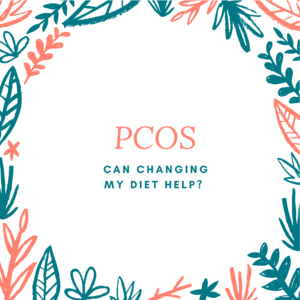Written by Naomi Leppitt, RD. Community dietitian in Winsor, UK.
Polycystic Ovary Syndrome (PCOS) effects 1 in 5 women. It’s a condition that effects how regularly women ovulate and have periods. It can include extra male hormones (testosterone) being produced, and so some women with PCOS may experience excess facial hair or body hair. Other signs include hair loss, acne, weight gain or difficulty getting pregnant.
As a consequence of PCOS, many women are resistant to insulin, and so they will produce more of it. PCOS is linked with insulin resistance. Insulin is the hormone, released from your pancreas when you eat foods containing carbohydrate. Carbs, when they’re digested, become sugars. Insulin helps the sugars in your blood get in to the cells of your body so that they can use the sugar for energy. If you’re resistant to insulin, it means this process doesn’t work so well, the sugars can stay in your blood and the cells don’t have access to it as a source of energy. There are lots of side effects of this including feeling more tired and thirsty. Excess insulin leads to an imbalance in testosterone. Because of the imbalance in the hormones in the body, in particular insulin, there is a higher association with health conditions such as: impaired glucose tolerance (IGT), type 2 diabetes (T2DM), gestational diabetes, insulin resistance and higher weight. There is also shown to be a greater risk for developing: metabolic syndrome, cardiovascular diseases (such as heart disease), depression and anxiety.

What may help women with PCOS?
- Weight loss– Some studies show those who are overweight who lost 5-10% of their body weight have had improvement on hormone balance, facial hair growth, menstrual cycle regularity, and how well they respond to glucose. This happens no matter what kind of diet they were on, or whether they took medications such as metformin.
- Note, it may be more difficult to lose weight with PCOS, which is where a dietitian can help. You do not want to leap onto a fad diet but do this in a balanced, nutritionally safe way.
- Due to the increased risk of heart disease and diabetes, it’s important for women with PCOS to try to eat well and exercise to reduce their risk.
- Omega 3’s – Some trial studies using omega 3 supplementation showed a benefit on – menstrual cycle regularity and on blood lipid profile (the balance and ratio of fats in the blood).
- A low-GI diet can help:
- GI stands for Glycaemic Index and it is a measure for how quickly or slowly the process of eating a food containing carbohydrate, breaking it down in to sugars and the sugars going in to your blood stream
- It’s better to choose low GI foods, as they have a slow break down in to sugars, plus they often are higher in fibre and keep you feeling fuller for longer. Having a slow release is like a steady stream instead of a sudden waterfall.
- Filling lower GI foods such as seeded breads, beans, peas, lentils, porridge, muesli, fruit and vegetables are good choices, as well as more al dente pasta, keeping the skins on vegetables and potatoes, choosing fruits that are less ripe (eg a pale yellow banana instead of a very spotty brown one!) and basmati, brown rice.
- Exercise also helps the body to be more sensitive / less resistant to insulin
- Aim for 30 mins a day, 5 days a week of moderate activity eg brisk walking, dancing, gardening, swimming, etc.
If you need any help with a 1-1 consultation on eating for PCOS then please do get in touch with Priya ([email protected]).
Sources:
Summary of Recommendations for Endocrine/Metabolic – Polycystic Ovary Syndrome on Pen Nutrition.
omega 3s https://ods.od.nih.gov/factsheets/Omega3FattyAcids-Consumer/
Pingback: Polycystic Ovary Syndrome – can diet help? – Nourish: Mind and Body